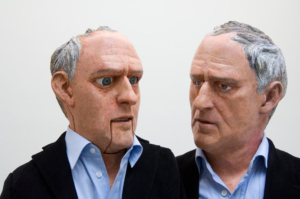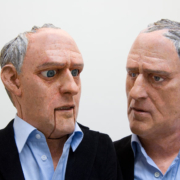What About The Voice in Your Head?- Episode 460

You have a Voice in your head. You probably know this. If you don’t, you should.
You might be thinking: “What voice? What is he talking about? I don’t have a voice. Maybe he has a voice in his head, but I certainly do not have one in mine!” Well, that’s what I’m talking about. It’s OK, we all have a voice in our head. The question is: What is that voice doing for you? Is it encouraging or discouraging? Is it positive or negative?
—
Photo by Stephen Huber
Is it really your voice or the voice of someone else? In this episode, Ted discusses the consequences of our inner voice, or self-talk, how to see it for what it is, be aware of how it impacts us, and how to begin to change it. If the voice in your head is telling you that this episode doesn’t pertain to you, then don’t listen to the voice, listen to this episode instead.
Listen to this podcast episode now:
What I do as a hypnotherapist is I help people change thoughts, feelings and behaviors that don’t serve them, such as anxiety and depression and behaviors such as procrastination and smoking, for example.
The idea is that a lot of what goes on in your mind that doesn’t serve you is because of your subconscious programming. In other words, the things your mind learned that don’t serve you any longer. That’s what I help people change.
We’ve been programmed in a lot of ways that might not necessarily serve or benefit us. Some of this programming came from other people, but some also came from us! From beliefs we formed a long time ago, from decisions we made during times of stress or trauma, and from things we saw or heard that we believed were true. Most of this happens before you’re around 8 or 9 years old, but it can happen after that as well.
So the question is, how can we be aware of this programming and how can we start to change it?
That leads us to the topic of todays’ podcast.
I recently ordered some copies of my book from Amazon. It’s called The Ultimate Guide to Letting go of Negativity and Fear and Loving Life. You can get it on Amazon. Anyway, I was leafing through it and I came across this chapter “ What About That Voice in Your Head?” And I thought that this is such an important topic and I should revisit it.
This chapter started as a blog post back in 2007. Then I turned it into a podcast topic for podcast number 4. Today’s is number 460.
What about the voice in your head?
You have a Voice in your head. You probably know this. If you don’t, you should.
You might be thinking: “What voice? What is he talking about? I don’t have a voice. Maybe he has a voice in his head, but I certainly do not have one in mine.” Well, that’s what I’m talking about. It’s OK, we all have the Voice in our head. Maybe more than one.
This voice in your head goes by many names. Thinking, Monkey Mind, Internal Chatter, Running Commentary, Self Talk. This voice allows us to make sense of our world. We judge, we analyze, we compare. We search for meaning, patterns, relationships. What most people call this voice is Me. I. Myself.
The important thing to remember here is that the voice in your head is not you, it’s a tool that you use. Just like a hammer is a tool but it’s not you.
But here’s the problem: we think the voice is who we are. Consequently, we believe everything the voice says. Like that t shirt that says,
I just do what the voices tell me to do.
Did you ever have the experience of saying something out loud, and then you thought to yourself “That is totally something my (mother, father) would say.” Was that your voice? Or is it your mother or father’s voice? (or grandmother, grandfather, teacher, coach, etc.) How much of the voice in your head is really your own? How much of the voice in your head is the voice of someone else?
In my hypnotherapy practice, I call this self talk. One of the first questions I ask my hypnotherapy clients is “What does your self-talk sound like? What does the voice in your head say to you most of the time?” And most importantly: “Is your self-talk serving you?”
Think about it: is the voice in your head supportive? Encouraging? Or, is it discouraging?
Have you ever heard the voice say:
· I am no good at _____
· I’m a failure
· I’ll never be able to ___
· I’m such an idiot.
· I hate looking at myself in the mirror.
To some extent we’ve all said those things. But if this type of self-talk dominates your life, then that can be a problem.
One of the most difficult things for us as modern humans is to get some distance from the voice so that we can observe it. But that’s how we can begin to change it.
That’s why practices like meditation can be so valuable. When we meditate, we set time aside so that we can step back and observe the voice in our heads.
Why is that a good thing? Because most of us are slaves to the voice in our heads. Until we can observe the voice with some kind of detachment, it will rule us.
Do you want more freedom from unwanted thoughts? More piece of mind? Try this: throughout the day, ask yourself the following question:
· What’s happening in my mind right now?
· What am I thinking now?
· How do these thoughts make me feel?
It’s called self inquiry and it’s powerful.
Realize that you create your reality using the voice in your head, with your thinking: thought by thought, sentence by sentence. We end up believing in the reality we create with our thoughts, and we act from these beliefs.
Now this idea of our thoughts not being who we are is a very ancient idea. This line of inquiry can be quite complex, ranging from the deeply philosophical to the obvious and mundane.
On the one hand, there is the concept of the ego and the question of “Who am I?”, one of the big questions of human existence. On the other hand, for most of us, there’s the awareness that there are habitual patterns of thinking that are at the very least self- limiting, if not self-defeating.
A seventeenth century philosopher by the name of Descarte is famous for the statement “I think therefore I am” (Cogito ergo sum), which he saw as a primary truth. Three hundred years later, another famous philosopher, Jean Paul Sartre, realized that when you are aware that you are thinking, that awareness is not part of thinking. These concepts are discussed in depth in two books that I highly recommend, “The Power of Now” and “A New Earth” both by Eckhart Tolle
For our purposes, let us assume for a second that who you are is not your thoughts. Consider that who you really are is the thinker of your thoughts. That is, who you are is the awareness that you are thinking or that you have a thought. Stay with me for a second here, OK? See, the problem that plagues most of us modern humans is that we really believe that who we are is our thoughts such as:
· I am no good at this..
· I am good at this..
· This is who I am..
· This is who I am not…
Who we think we are and what we say we are, we can call our story. Each of us has a story about who we are. Consider that for the most part, this story is not real, it is invented by us or maybe, inherited.
Consider the two statements:
· My business failed.
· I am a failure.
The first is a statement of fact, that is, what happened. The second is a story about what happened, an interpretation. We can agree that not everyone who has had a business fail is a failure.
One of the most important skills that we can learn to develop is to be able to make the distinction between who we are and what we think , and to understand that most ( if not all) of our thoughts are interpretations (stories) of events, and may have little to do with what’s going on out there.
The reason you want to learn that skill is so that you can have some detachment from you thoughts so that we can observe them and change them if they are not working for you.
Now you might be thinking “Geez Ted, enough already with this psychobabble!”
Here’s the thing you need to get. If you want to get what you want, whatever that is, you need to identify the story the voice in your head is telling you about why you can’t have it. If you can’t identify those limiting thoughts and beliefs, forever will they dominate your destiny.
We believe the voice in our head and most of the time we do what it tells us to do. The Buddha said we become what we think about. Once you have an awareness of those patterns of thinking that are self-limiting, self-defeating, or self-destructive then you can start to change them.
It’s not easy because our tendency is to identify with our thinking. We can become so attached to what we think and believe that we will even defend our beliefs to the point of killing someone who disagrees. Some people say it’s our nature to be violent. But, because of our capacity to be aware of our thinking and change it, we can change our nature.
Take this example from I client I worked with: He was a single young man with friends who liked to hike and would often invite him to join them. He would politely decline, saying that he has no interest in hiking and doesn’t hike. Although he would never say it to his friends, he considers hiking a waste of time, and not very safe, because
there’s wild animals and insects, waste of time, and not very safe, because there’s wild animals and insects, dangerous terrain, and sometimes dangerous humans. He won’t admit to being afraid but doesn’t see it as a practical and worthwhile recreational activity. He feels more comfortable staying home reading a good book.
One day the young man met a young woman he was attracted to. They went out on a date, and she told him that she likes to hike. The young man didn’t reveal his feelings about hiking, because he wanted to continue seeing her and felt that his chances were better if he kept his mouth shut. But she immediately suggested that they go hiking together and before he can object, a date is set.
In spite of his indifference to hiking, he goes along to get along. They go on their hike, and after a while they come to a pleasant spot in the forest. She pulls a blanket out of her backpack, along with a nice bottle of wine and some crackers and cheese. He is impatient to start back and finish the hike when a book she is reading falls out of her backpack, and the young man sees it’s a book that he has read and feels quite passionate about. They spent the next hour picnicking and discussing the book.
At the end of the day, the young man reflected back on his experience and decided that for the most part, he enjoyed himself and would do it again even though he would rather go to a park than for a hike. At this point, he started to wonder to himself “Why do I dislike hiking?’
Now he has detachment from the thought “I don’t like to hike” and begins to see this statement not as truth, but as a story he has been telling himself for some time, since he has no real experience with hiking.
And then he remembers a time when he asked his dad if he could join the Boy Scouts, and his dad said “The Boy Scouts do a lot of hiking and I don’t think that it’s safe to be hiking around out there where someone could get hurt or bit by a snake or an animal. Besides, it’s a waste of time when you could be doing your homework or reading a book.”
The young man realized that his story about not liking hiking was given to him, he inherited it. Therefore, the “voice” he had believed in for all these years was not even his own, it was the voice of his father. He now considers that maybe he can like hiking, if he can tell a different story about it.
Let me ask you: How much of what you think most of the time is just programming? Remember it’s not what happens to you that matters, it’s what you think about what happens to you that will determine your course of action or inaction, effectiveness or ineffectiveness. What you think about what happens to you is your interpretation or story. This interpretation is in a large part determined by your past experiences, culture, upbringing, religious beliefs, education, as well as your current peer group.
As a hypnotherapist I help my clients to be aware of and identify stories that they hold as beliefs, that are holding them back from what they want to have, be, or do.
I help them to see that since these stories are inventions maintained by the “voice”, that they are free any time to choose or invent a new story. It’s all made up. So hopefully, they can make one up that is empowering, encouraging, and inspiring. I help them instill these new beliefs using the power of suggestion through hypnosis.
In closing, let me leave you with this: ultimately, whether your thoughts about yourself are true or not is irrelevant. What matters is: what does your thinking do for you? Move you forward or hold you back? Give you joy or despair? Help you to love or disconnect you from loving? Help you grow or keep you stuck? You have a choice as to what to think and believe about anything.
Choose wisely. For this week, observe and listen to the voice in your head, but don’t believe you believe a word of it. If you notice that the voice is saying stuff that is not helpful, then practice a new voice using positive affirmations.
Here is the quote for today’s episode:
The voice in your head is like a wild horse taking you wherever it wants to go…When the voice in your head finally stops talking, you experience inner peace. ~Miguel Angel Ruiz, author of the Four Agreements.
Thanks so much for reading this, Ted
Want to catch up on previous episodes? Click Here >
Are you aware that the voice in your head is holding you back, stopping you and making you feel bad? If so, it’s time for Ted in your head. Reach out to Ted for a complimentary half hour consultation by going to https://TedMoreno.com/contact
You can get all your questions answered, find out how hypnotherapy can help you, and if you are ready, schedule your first appointment.




